James Bond 007
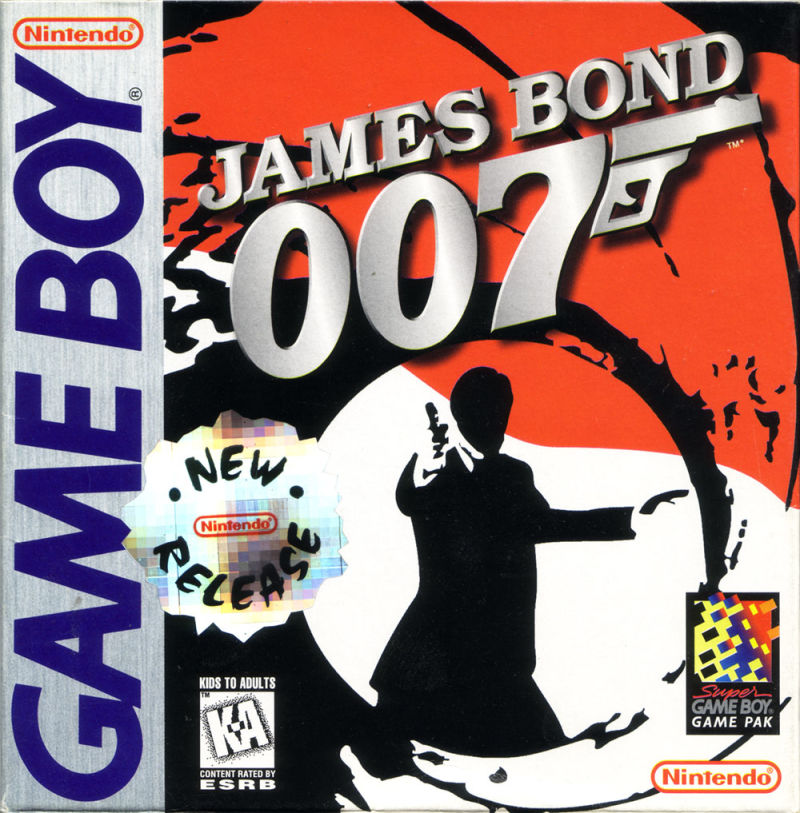
- European release in January 1998
- North American release in February 1998
- North American release in December 1998
- Never released in Japan
- Developed by Saffire
Boy, Game Boy

When it came out, Goldeneye took the world by storm. It rejuvenated the aging spy and made him relevant and cool again. But to some kids, the movie was a secondary concern. To them, what made James Bond cool again was Goldeneye 007 for Nintendo 64. I am one of those kids. Nights spent playing multiplayer matches against friends. No Oddjob, Facility, Slappers Only, yeah, baby, yeah (… sorry, wrong British spy). With our Nintendo 64, we were playing the best game of its genre. Before Goldeneye, if you wanted to play the best First-Person Shooters, you had to get a $2,000 PC. Doom, Duke Nukem 3D, Quake were all complex PC experiences. They had ports to consoles, especially Doom, but those were unsatisfying. You did not get the full experience, only a gimped substitute. But when Goldeneye came out, you could not only play a great First-Person Shooter, it was arguably the best FPS for a time. The controls were primitive but the game was built around them, not despite them. It was a revelation, and birth a genre still vacuuming up all the attention and money to this day: the console FPS. Game Boy Essentials is not interested in the multimillion game as a service console FPSes that grew from the N64 classic like Battlefront II or Destiny 2. Instead, we’re covering the second and only other thing Nintendo did with the rights to the James Bond franchise in 1998. They commissioned a Utah developer to make a Legend of Zelda clone starring James Bond on Game Boy. It was so crazy it actually worked and we ended up with an essential Game Boy title.
Goldthumbs
I purchased James Bond 007 in 1998 because it was, of course, a James Bond game. By then I had started getting interested in James Bond beyond the Nintendo 64 game. I saw the game on a shelf, unaware that it even existed before that exact moment; I promptly purchased it. This meant that my first experience with quintessential villains Oddjob and Jaws was through their portrayal in a Game Boy game. Life before ubiquitous internet access was weird.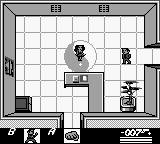
This highlights a weird reality of movies before the modern era of the internet. You could not easily catch up on a franchise like James Bond since you were at the mercy of other realities. You could only watch a James Bond movie, for example, if it was on TV. If you were rich enough to afford cable (my family could), you had more opportunities to catch up on those movies since you had more channels. Or you could rent it if your local video rental store had it. Since I lived in a small town with one small VHS rental store of about 500 movies, they did not have a lot of movies beyond the very recent. Popular movies were often borrowed by other people so you had to pick something else. You could buy VHS tapes in stores, but those were kind-of expensive and my family did not buy a lot of movies; we rented instead. And since I was an anal-retentive kid (I still am) I had to start with the first film, Dr. No, so it was a no go if they only had Goldfinger. God forbid I pick up a copy of a later film without having seen the first one!
A couple of summers after I got the Game Boy game, Radio-Canada played a James Bond film every Thursday at 9 pm over the summer. I saw them all that way, in crummy pan-and-scan with their gloriously dumb French translations. I could finally experience the movies, just later than I wanted. That Radio-Canada summer event is as much responsible for my appreciation of James Bond as anything else. It was in the correct production order and during the summer so I could go to bed late and finish the films. Before the internet made everything available all the time, you became a fan of the things that were accessible.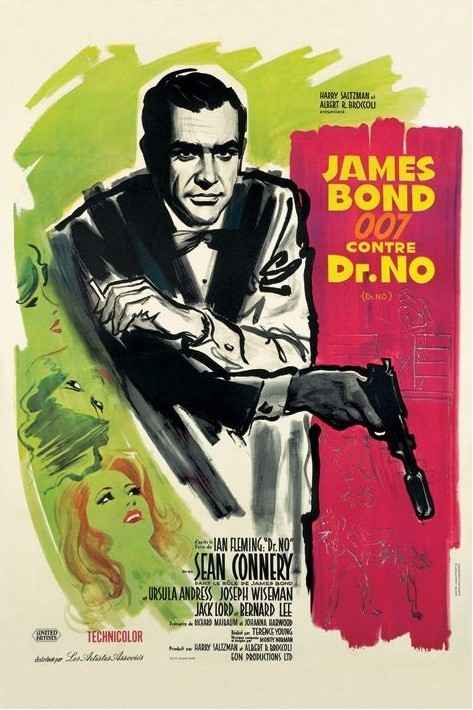
A View to a Green-Hued Kill
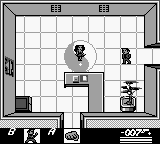
Let’s get back to James Bond 007 on Game Boy and how it came to be. Since it was released a mere six months after the N64 juggernaut, it would be easy to lump it with the James Bond video game licence ordeal caused by the storied success of the Nintendo 64 game. You can see that the Fleming clan, or MGM or whoever was overseeing the franchise expected another giant success like Goldeneye 007 but the developers put to the task just couldn’t pull it off. There was too much ambition and not enough artistry, the fit was never right. They tried games based on the current movies and it didn’t work. They went their own way with games that emulate the movies and it didn’t work. They went so low as to put the name Goldeneye on games that had nothing to do with the Rare-developed game and it didn’t work. James Bond seems like a perfect video game franchise, but the developers who could really make the concept sing don’t bother with licensed games.
In this climate of high expectations and big budgets, James Bond 007 on Game Boy seems impossible. No one in their right mind would think to release a small Game Boy game after freaking Goldeneye 007! But all of this does not apply, since the development of the game had to start before Goldeneye’s accursed success. The N64 game released in the summer of 1997, and with the Game Boy game releasing a mere six months later, there is no way in hell they started the game’s development after Goldeneye 007 became a success. I also do not believe there was any attempt to capitalize on the success of Goldeneye. Game Boy licensed games were never meant to be exciting franchise events to be covered by glossy magazines; they were always placeholders, meant to fill up shelf space displaying their respective franchises in stores. If they had known how popular Goldeneye 007 was going to be, I’m sure they would have changed the Game Boy game to be a Goldeneye title. I also looked at the Internet Archive’s collection of video game magazines and I found no reference to the Game Boy game until a full year later, in 1999. If Nintendo ever thought of James Bond 007 as a game that was meant to capitalize on the success of Rare’s game, they did the worst job at it. Looking at the low-key release of the Game Boy game, I think they had a broad licence to release one James Bond game on each of their platforms. Yamauchi, Nintendo’s president and real-life James Bond villain, then found appropriate developers who understood each system’s appeal. A loud, inventive FPS by their British partners at Rare for their loud 3D console. A driving game also by Rare for the Virtual Boy. It was obviously never finished, just like the Virtual Boy itself. Finally, a quirky Zelda clone by Saffire, a small developer hungry for success, for the small console that ruled the gaming world.
That’s how I believe it was licensed to Nintendo; keep the British spy on worldwide shelves. The thing is I don’t know the truth and it’s possible we will never know.
A Quantum of Gameplay
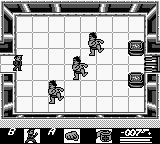
Saffire Corporation was a small developer based in American Fork, Utah who only had two games under their belt when they made James Bond 007. Their biggest call to fame seems to be helping Blizzard with the development of Brood War, the quintessential expansion to Starcraft. Looking at the city’s census data, it probably means that this game was made by Mormons, a religious community renown for illegally distributing sanitized versions of movies that removes the sexual content and non-Mormon parts of popular films. I guess it makes sense to have such a sanitized James Bond game made by a developer based in a predominantly Mormon city.
There were many ways the developers at Saffire could pull off a James Bond game. Many decisions they had to make to turn an idea into a complete product. They could have done a sidescroller, like Mega Man or Contra to bank on Bond’s riveting action. They could have done a visual novel to highlight his fun stories, or a driving shoot-em-up like Spy Hunter to showcase his driving abilities. They instead chose to portray the biggest time waste in all James Bond stories: James walks around doing spy stuff. To portray that they went with a top-down adventure view, very similar to what you saw in The Legend of Zelda.
For some strange reason they ended up not having the same symmetry in all four directions. In every Zelda game, whether you move up or down changes nothing to your walking or attack speed. It makes no sense on a geographical plane, mind you, since you’re seen from an angle but the world operates on a perfect top-down but it makes sense intuitively. With this game, when James Bond is moving horizontally, he’s fast on the trigger, zippy and fun to control. When moving vertically though, he is slower all around. You always feel like James is going up a steep hill, even when going down. Bashing with the scimitar is noticeably slower, shooting your guns has extra frames of animation and this ultimately forces you to optimize; you’ll constantly try to position enemies so you can attack them from the sides where you’re faster than them. More dangerous.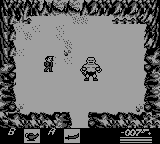 James Bond never faces evil face on. He faces it… sideways.
James Bond never faces evil face on. He faces it… sideways.
That was in spite of this major quirk an interesting choice. I might have Stockholm Syndrome about crappy Game Boy titles, but to me it feels like it ultimately makes the game more interesting. It forces you to consider your angle when attacking enemies. You need to be seen by enemies before they start attacking you, so you always have time to survey their placement when going to a new screen. This allows you to stop for a second to plan an angle of attack and select a weapon. It adds just enough strategy to your enemy encounters.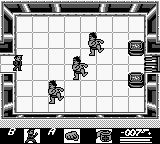 The game seems to imply that Kurdistan is a country, which must not have been well received in Turkey. Look it up.
The game seems to imply that Kurdistan is a country, which must not have been well received in Turkey. Look it up.
So the top-down view is similar to Zelda but don’t mistake the overarching structure of the game for a Zelda clone though. The game features levels, with no backtracking between them. After all, James Bond never goes to Istanbul in his movies and then exclaims Wait a minute, let me go back to Beirut and use that laser pen I just found here to open the locked door I saw back there. James always moves forward. It doesn’t mean that within levels you’ll never backtrack. You will have little adventure-style puzzles to solve by talking to different people and trying different permutations of objects. The game starts with a very good example: a saccharine fetch quest forces you to search beds in multiple houses to find a hammer to repair a bridge to proceed. It’s basically a tutorial, a way to prepare you for what’s ahead.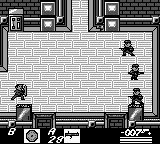
On a more inspired note, the third level has a guard who will not let you pass through a door. Do you bribe him? Shoot him? Sleep with him? No, you shoot the light with your gun and walk past him once it’s dark. The game has many of those quirky little fetch quest adapting James Bond tropes. In Marrakech, you very clearly have sex with a brothel’s Madame to get a diamond, which you exchange for a tranquillizer gun to steal hotel keys from a casino patron who works for the villains. Yes indeed: you have to go to a casino and play card games. Goldeneye 007 on N64 focuses on James Bond as a cold-blooded killer with cool guns. James Bond 007 on Game Boy focuses on James Bond as an aging misogynist who blows government money in casinos to score with women young enough to be his daughter. You know, the good stuff!
Next comes the matter of item drops. Half of the game is an amalgam of fetch quest puzzles, but the other half is combat. When you kill an enemy, it will sometimes drop a box. Item drops might sound like a simple concept with little impact on the overarching game but when the game is as simple as this one, it amounts to everything. Here, enemies drop less ammo than what is needed to kill them, and your pockets aren’t deep enough to build a sizeable reserve of bullets. It means you can easily run out of ammo. This means you’ll fight using the machete you initially acquire to cut bushes. The machete also kicks enemies back when you hit them with it, giving you spatial control over your enemies. The guns will only stop them for a moment with no kickback, and when you’re fighting three mooks at a time, spatial control is more important than ranged damage. There’s also this very unconscious mashing of the machete that will help you: when you mash the sword’s button you can more easily hit your enemies the moment they leave their invincibility frames. You can’t fire the guns by mashing the button in contrast. You’ll run out of valuable ammo and guns have longer animations that need to finish between shots.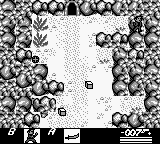
So by lax design, the sword, not the gun, is the best weapon in a James Bond game. But once you find the machine gun, the grenades, the rocket launcher in Tibet, you can start switching it up because you have more options. I would use the best weapon I had until I was out of ammo, switch to the next best and so on and by the time I had cycled through all the weapons I had found a nice amount of ammo for the first one so I could start using it again. So you have a weapon cycle. It makes the game more fun. Couple that with conservative health drops which keep the game tough but fair and you have reasonably complex combat strategies on Game Boy. It’s not much when compared to our modern sensibilities, but it’s something.
The cherry on top of the whole enterprise is the soundtrack. It’s got all the trappings of a James Bond soundtrack, featuring a lot of variations on the classic James Bond theme, just like the movies. It’s not too repetitive, with a good number of tracks, and it somehow sounds like it was made by a European chiptune composer when it actually wasn’t. European video game composers who initially worked on British micros like the ZX Spectrum have developed a different musical approach than American or Japanese composers informed by the peculiarities of the sound chips of those micros. A good example of that difference would be the NES game Silver Surfer. Its music sounds totally alien to the NES.
With all we’ve discussed so far, you have the solid baseline of a somewhat competent game. You can build a solid number of levels from that baseline.
Exploring the Game’s Levels
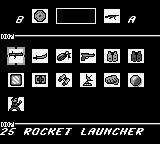
You start in China, with only your fists as weapons. In video game terms, it’s a tutorial level, with very easy versions of more complex things to come. You have simple combat, a couple of very dumb puzzles, you find hidden documents, everything to sell you on the idea of the game. In movie terms though, it’s the cold-open action scene that feels like a Kung Fu homage. You beat up guys in Gi to get to their boss, Zhong Mae, who also turns out to be the Bond girl of the game and then you flee on a boat. It feels like a section ripped from You Only Live Twice.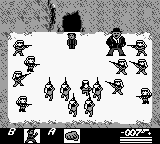
You go back to MI6, unfortunately without being treated to a credit sequence rendered on Game Boy. Most of everything that happens in MI6 is straight out of the Sean Connery/Roger Moore classic James Bond films. You talk to Moneypenny who pines over you but knows she should know better, you get your orders from M who badgers you because he secretly knows you’re the bigger man, and you grab your gadgets from Q, who’s just had it with your constant bullshit. They managed to convey all those classic movie interactions on Game Boy. That’s where I started realizing that this wasn’t just a James Bond game, it’s a James Bond love letter. In Q’s laboratory, there’s a guy who shows you he has a trap sofa in which he can hide, and there’s a rocket-powered couch that you can fiddle with that then propels against a wall, obviously mangling the lab technician sitting on it. Q’s team has shifted its focus to spy upholstery! They really gave it their best to try and recreate the funny moments you get from the best Q scenes.
You then go to Kurdistan, where you get to do a bit of everything that the game has to offer. You have a trading sequence to get access to a bar, you shoot dudes with swords and get a sword of your own, and you fight a boss at the end, beating him with electrified keys you were given by Q.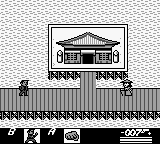
The next section is Marrakech, which is obviously the main draw of the game. They were clearly trying to emulate movie moments like the first act of Dr. No. You have a lot of things to do here, and you could easily spend half your playtime in this section your first time around. You have multiple trading sequences that make no sense (let’s trade a roasted chicken for a cat?) and your first goal is to attract a high roller at the baccarat table who works for Oddjob. You want his hotel key so you shoot him with a tranquillizer gun from a little opening in the casino wall that you access from the sewers underneath the black market. It’s all clearly inspired by the plot to steal the Lektor from the Russian Embassy in From Russia With Love. It all ends with you being captured by Oddjob (wasn’t he dead by electrocution at the end of Goldfinger by the way?) who then throws you without your items in the Sahara Desert. Oh by the way, Oddjob totally talks in this game when his whole deal in Goldfinger was that he didn’t speak. There’s an electronics store in Marrakech, before you get to the desert, which sells the satellite link. It’s kind of a crappy GPS. It just tells you which screen you’re on, nothing more. It is not mandatory to get it, you can completely ignore it and the way Marrakech is built with its weird copy-pasted tunnels, you can very easily miss it. And not having the satellite link to help you figure out the desert’s layout can really screw you in the Sahara after Marrakech.
After figuring out how to survive the desert and getting to its airbase, the game sections are mostly action-based. The game picks up the pace and in movie terms the quietness of the first act is replaced by frenetic action in the second and third acts. You climb a mountain in Tibet and finally start getting more weapons, but then you’re captured again and end up in a secret base, where you fight your way out after talking with your one-time enemy, Zhong Mae. Turns out you both want the same thing and you’re on the same side! What a surprise, like it doesn’t happen in every James Bond story. You beat Oddjob with the help of a shield to reflect his hats back at him (that’s a Zelda knockoff if there ever was one) and you go back to Kurdistan, now a war zone bombed by the big villain of the story, General Who-Cares. You follow him to Russia, where the entrance to his base is full of nuclear waste and where Jaws waits for you amongst magnets. Having ginormous metal teeth, I think you know what that means. Poor Jaws can’t get a break. The final villain has missiles and lasers aimed at London or something, you kill him in his mech suit (seriously?), save Zhong Mae (who’s strapped to a missile) then disarm his rockets and save the world!
The ending cutscene is interesting because it’s actually got a secret longer version. The regular ending sees James, being the suave spy he is, tell Zhong Mae he’s bringing her back to China on a slow boat ride home. I believe that at this juncture, our 8-bit, 4-tone video game character is implying he’s going to fuck this woman multiple times on a boat. She’s all happy about that and that’s your ending, here are the credits and a bunch of secret save names to go straight to the card minigames.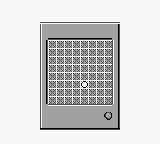 Which James Bond actor is that supposed to look like? Mr. Bean?
Which James Bond actor is that supposed to look like? Mr. Bean?
The optional ending goes a step further. Back in the second level there was a hidden object in Q’s lab called the M.A.R.B.L.E. It looks like a big gem, so you have no idea what it does. It’s behind a wall that you blow up with the scientist on the rocket chair. The first time you interact with the chair, Q stops you, but the second time you do get to send the chair flying to its user’s doom. If you manage to find the M.A.R.B.L.E. you then spend the whole game carrying it, even though you get captured and stripped of your equipment twice. They don’t bother taking your suspicious object of unknown use. Of course not! You go through the first part of the ending just the same. But then you see the M.A.R.B.L.E. sprite for a split second move towards the water next to Bond and it turns into what looks like a canoe! Mae and Bond embark and then you’d think they’d proceed to the sexual plan Bond just laid out. But a submarine lifts up the canoe and tells Bond he’s to escort them back to China. They’ve copied the ending from The Spy Who Loved Me! Zhong Mae is pissed that their vacation is cut short, but James reassures her. The submarine captain is a buddy of his and he’s going to take the long way back. Being Bond and all, of course, you’re supposed to understand he’s going to then fuck her right in view of the submarine’s bloody periscope.
I mean, is James Bond renowned in the British military for his sexual depravity? Oh yeah, James Bond! He’s the old bloke who’s always shagging in front of our scopes! It’s the only thing that gets him off.
I looked up the game years later online and only by reading FAQs did I learn there was a secret ending. You are not going to figure this thing on your own. But I’m actually impressed by the secret ending. That Bond carries a ridiculous inflatable gadget around the world and only uses it to get laid is the ultimate Bond move.
Not Released in Japan… Wait, What?
You read that right, Nintendo published a Game Boy title that never saw release in Japan. The exact reason why it happened with this game is nebulous (licensing rights, perhaps?) but this game will be at the forefront of a clear trend. Later on in 1999, 2000 and 2001 you will see many major releases not bothering to even release in Japan. The Japanese public had already moved on from the Pokémon console by then.
Conclusion
James Bond 007 is a proper romp. It encapsulates an aspect of James Bond I haven’t seen in other video games; the farting around. Like the scenes in A View to a Kill where James just runs around with a ridiculous fake name, or in Goldfinger where he’s Auric’s hostage and he just chillaxes. I guess James Bond 007 would be the game he would play during those moments. Removing his sunglasses, putting on the cartridge and playing for a bit before the screen suddenly turns into M badgering him for slacking on the job, revealing his Game Boy to be a secret gadget just like one of his watches.
M: No time for useless distractions, Bond. I’ve got new information for you. Our agents in Belgrade have deciphered the message you picked up in Tripoli and somehow, don’t think too hard about it, you’ve got to go to Macau.
Bond: Is it really essential, M? I was about to beat the high score.
Moneypenny (obviously listening on the conversation from her intercom): Stop playing the Game Boy and go play the Spy Man, James! And do bring me back a proper gift this time, would you?
I guess he’d instead have to play his Game Boy on the plane while the henchman with the physical deformity is stalking him from two seats back.
This article was first published on the .
This article was last modified on the .